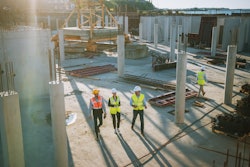
Construction management runs in my blood. My father – a construction manager himself – started taking me to his jobsites and showing me the ins and outs of the profession from a young age.
Being on jobs with my father was a high point in an otherwise difficult period of my life. I barely spoke any English when my family moved from Hong Kong to northern California. Growing up, the language barrier hurt my grades for many years, and on top of that, a lack of other mixed-race individuals in my suburban Bay area school made me a target for bullying.
This early, negative experience was tough; but, ultimately, it laid the foundation for my making diversity, equity and inclusion (DEI) core principles of the business I co-founded, NOVO Construction. It also directly informs NOVO Construction’s relationships with our local community.
Lagging DEI in the Construction Industry
Despite persistent recession fears and rising interest rates, the construction industry remains a bright spot in the U.S. economy. Indeed, many construction firms are struggling to keep up with demand due to labor shortages. As noted by the Associated Builders and Contractors (ABC), construction companies will bring in more than 342,000 new employees in 2024 – on top of normal hiring numbers – to meet America’s building-related needs.
Construction must find ways to expand its talent pool, but, to do this, the industry must acknowledge an underpinning factor in its numbers dilemma: lt lags far behind other industries in DEI.
According to the Bureau of Labor Statistics, nearly 88% of those employed in construction are white, versus 77% within the overall workforce. Meanwhile, a mere 6.7% of construction industry workers are black or African American and just 2% are of Asian descent. About 11% of construction professionals are women.
DEI: Not Just 'Nice to Have' But Necessary
Examined from this perspective, the industry must recognize that DEI is not just a moral imperative; it is also essential for the industry's long-term success and growth. So how can organizations pursue DEI in a truly effective way?
NOVO Construction, which is a certified Minority Business Enterprise (MBE) through the National Minority Supplier Development Council (NMSDC), via the Western Regional Minority Supplier Development Council (WRMSDC), started as a three-person shop in March 2000 – the same month the dot-com bubble burst. Today, we employ more than 300 people and consistently rank in the top five of the San Francisco & Silicon Valley Business Journal's list of the largest general contractors in the Bay area.
Rather than just give it lip service or treat it as an add-on, as many do, my cofounders and I made DEI a cornerstone of NOVO Construction’s operations from its inception. Half of our corporate leadership team members are women. We continually seek to partner with community organizations that promote DEI and with diverse subcontractors and suppliers.
NOVO Construction’s proactive approach to DEI is key to its success as a general contractor and fundamental to its growth and reputation. Here are some key factors that helped NOVO Construction with its DEI efforts:
1. Know your “why” and communicate it clearly.
Your company needs to know why it's pursuing DEI, both from a values and a business standpoint.
My background as a first-generation Chinese-American informs my company’s approach to DEI. At NOVO Construction, everyone who works for us, or with us, knows we put relationships first, and that we believe DEI is a prime way to accomplish that goal.
My father’s work colleagues came alongside me and offered me vital mentorship and new work opportunities after my father died when I was just 19. They showed me that empowering others to use their talents to the fullest is one of the most impactful things you can do – in business and life
By clearly articulating your own “why,” you not only help ensure buy-in from your company’s leadership, but can also easily and consistently communicate the reasons behind and benefits of DEI initiatives to your workforce at large.
2. Make inclusive hiring, promotion and community partnerships a priority.
NOVO Construction actively promotes job opportunities to underrepresented groups – half of our corporate leadership team members are women. Our NOVO for Change initiative seeks partnerships with diverse community organizations – such as the nonprofit design and construction organization, Girls Garage – that focus on education, job training, community development, and creating opportunities for female representation in our industry.
I never would have become CEO of a major commercial construction company without people who believed in and supported me. A host of personal and professional experiences have shown me that strong relationships with clients and partners and giving back to the community are the keys to rising to the top in any area of life. These guiding tenants help ensure NOVO Construction remains focused on providing extraordinary customer value and promoting a healthy work culture.
When you seek out diverse partnerships, you not only bolster your local community, you expand your talent pool.
3. Put diversity training and accountability front and center.
Racism and other biases that impede DEI are present at all levels within the construction industry. Companies need to help supervisors and managers learn best practices for promoting equitable decision-making and leadership practices.
Like my father taught me, the hands-on approach is often the best way to convey an idea to others. At NOVO Construction, the leadership team is always ready to get down in the trenches to help with DEI. We offer regular training sessions for employees about unconscious bias, cultural sensitivity and inclusive practices.
Companies also need to hold those who refuse to adapt accountable. If poor behavior is not met with consequences, it will continue.
4. Don’t underestimate the impact of Employee Resource Groups (ERGs) and mentorship programs.
ERGs allow employees with shared identities and experiences to come together in support of one another. They also serve as a valuable resource for the company at large, helping leadership stay informed of minority employee needs and develop impactful policies, workshops and events.
ETGs pair well with strong mentorship practices. I’ve been fortunate enough to have a number of mentors over the course of my career. They helped me learn new aspects of my chosen industry and offered valuable wisdom during stressful moments. At NOVO Construction, our mentorship program, headed by our Director of DEI Sarah Garcia, connects underrepresented employees with leaders and provides guidance for professional growth.
5. Seek out & uplift diverse suppliers and subcontractors.
DEI may start with a company’s leadership team, but, ultimately, it must extend throughout the organization and beyond – to subcontractors, vendors and suppliers – thus creating a network of businesses with shared values. So, seek diversity through your supply chain.
Establish clear criteria and evaluation processes that prioritize diversity and inclusion when selecting business relationships. For instance, NOVO Construction’s subcontractor diversity initiative aims to extend our DEI commitment to our subcontractor and supplier pool. We’re auditing our current list of subcontractors to identify our existing diverse partners and confirm their certifications. At the same time, we’re working to expand our diverse supplier database through outreach. In the past three months alone, we have personally contacted more than 2,500 companies, resulting in the addition of over a hundred diverse subcontractors to our bid pool.
As an industry leader, NOVO Construction feels a responsibility to provide resources and support to help our diverse partners expand their capacity and capabilities. We’ve found, for example, that some diverse firms feel they’re too small to bid on many prime construction projects. NOVO Construction not only assures these companies that they are not too small to bid on such projects, but also offers mentorship to help them grow. We even break up bid packages so smaller companies can take on a manageable portion.
At NOVO Construction, we are excited about our potential to have a significant, positive impact on the construction industry by promoting inclusivity and providing greater opportunities for diverse businesses. We hope others join us in seizing the chance to reshape our industry’s future.



















